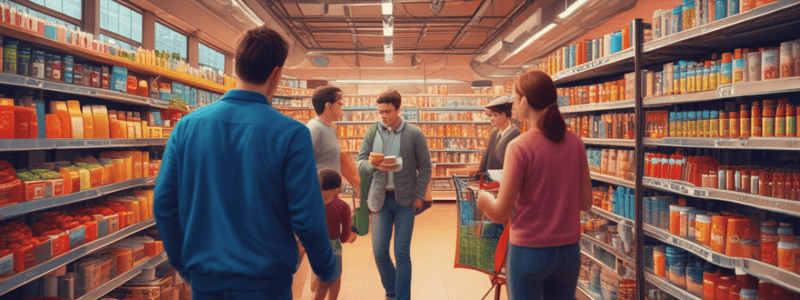Podcast
Questions and Answers
What does microeconomics study in relation to consumer behavior? WHy is C the correct answer
What does microeconomics study in relation to consumer behavior? WHy is C the correct answer
- How to increase production efficiency
- The economic behavior of individual units only
- How consumers interact with markets to optimize utility functions (correct)
- The political factors influencing consumer behavior
What is the main goal of consumers as rational decision-makers according to microeconomics?
What is the main goal of consumers as rational decision-makers according to microeconomics?
- To follow trends regardless of cost
- To always choose the cheapest option
- To maximize their utility from purchases (correct)
- To minimize their budget allocation
What is opportunity cost in consumer decision-making?
What is opportunity cost in consumer decision-making?
- The total budget spent on all alternatives
- The cost of goods and services purchased
- The value of the next best alternative forgone (correct)
- The cost of the most expensive option chosen
How do individuals in microeconomics allocate their limited resources?
How do individuals in microeconomics allocate their limited resources?
Which factor influences consumer choices according to microeconomics?
Which factor influences consumer choices according to microeconomics?
How do consumers aim to interact with markets, according to microeconomics?
How do consumers aim to interact with markets, according to microeconomics?
What is the opportunity cost of the jacket?
What is the opportunity cost of the jacket?
How do consumer choices influence supply and demand?
How do consumer choices influence supply and demand?
What does elasticity in consumer demand refer to?
What does elasticity in consumer demand refer to?
How does changes in consumer behavior affect macroeconomic phenomena?
How does changes in consumer behavior affect macroeconomic phenomena?
What is a common focus of research in consumer behavior?
What is a common focus of research in consumer behavior?
How does microeconomics contribute to understanding consumer behavior?
How does microeconomics contribute to understanding consumer behavior?
What is the primary role of research assistants in the practical application of microeconomics?
What is the primary role of research assistants in the practical application of microeconomics?
According to the passage, what is a potential benefit for microeconomists who collaborate within the research community?
According to the passage, what is a potential benefit for microeconomists who collaborate within the research community?
What is the key factor that determines whether a research assistant will be offered co-authorship on a project?
What is the key factor that determines whether a research assistant will be offered co-authorship on a project?
Which of the following is a key concept that production theory in microeconomics examines?
Which of the following is a key concept that production theory in microeconomics examines?
What is a key responsibility of research assistants in the practical application of microeconomics, according to the passage?
What is a key responsibility of research assistants in the practical application of microeconomics, according to the passage?
What is a potential challenge or limitation faced by research assistants in the field of microeconomics, as suggested by the passage?
What is a potential challenge or limitation faced by research assistants in the field of microeconomics, as suggested by the passage?
Which of the following best describes the role of microeconomics in understanding market structures?
Which of the following best describes the role of microeconomics in understanding market structures?
How does microeconomics address the issue of scarcity and resource allocation?
How does microeconomics address the issue of scarcity and resource allocation?
In the context of individual decision-making, what role does the concept of opportunity cost play in microeconomics?
In the context of individual decision-making, what role does the concept of opportunity cost play in microeconomics?
How does the principle of supply and demand in microeconomics influence market equilibrium?
How does the principle of supply and demand in microeconomics influence market equilibrium?
What is the primary goal of microeconomics in analyzing individual economic behavior?
What is the primary goal of microeconomics in analyzing individual economic behavior?
In the context of market structures, how does microeconomics contribute to understanding resource allocation and efficiency?
In the context of market structures, how does microeconomics contribute to understanding resource allocation and efficiency?
Which of the following factors is MOST likely to influence a consumer's brand loyalty, according to the passage?
Which of the following factors is MOST likely to influence a consumer's brand loyalty, according to the passage?
How does the concept of opportunity cost relate to consumer behavior, as discussed in the passage?
How does the concept of opportunity cost relate to consumer behavior, as discussed in the passage?
According to the passage, which of the following marketing strategies is MOST likely to be effective in influencing consumer behavior?
According to the passage, which of the following marketing strategies is MOST likely to be effective in influencing consumer behavior?
How does the concept of social influence, as discussed in the passage, affect consumer behavior?
How does the concept of social influence, as discussed in the passage, affect consumer behavior?
Which of the following is a KEY constraint that shapes consumer behavior, according to the passage?
Which of the following is a KEY constraint that shapes consumer behavior, according to the passage?
How does effective brand management, as discussed in the passage, contribute to influencing consumer behavior?
How does effective brand management, as discussed in the passage, contribute to influencing consumer behavior?
Which of the following best describes the concept of perceived utility in consumer behavior?
Which of the following best describes the concept of perceived utility in consumer behavior?
What is the primary consideration in a consumer's cost-benefit analysis when making a purchase decision?
What is the primary consideration in a consumer's cost-benefit analysis when making a purchase decision?
Which of the following is NOT a key driver of consumer choice mentioned in the passage?
Which of the following is NOT a key driver of consumer choice mentioned in the passage?
According to the passage, which of the following statements about consumer decision-making is true?
According to the passage, which of the following statements about consumer decision-making is true?
Which of the following factors is NOT mentioned in the passage as influencing consumer behavior?
Which of the following factors is NOT mentioned in the passage as influencing consumer behavior?
According to the passage, what is the primary goal of consumers when making purchase decisions?
According to the passage, what is the primary goal of consumers when making purchase decisions?
What term refers to individual values and tastes that guide consumer decision-making?
What term refers to individual values and tastes that guide consumer decision-making?
Which factor does NOT limit consumer choice and decision-making?
Which factor does NOT limit consumer choice and decision-making?
What is the concept that drives individuals to engage in activities like purchasing goods or services?
What is the concept that drives individuals to engage in activities like purchasing goods or services?
Which of the following does NOT influence consumer preferences according to the passage?
Which of the following does NOT influence consumer preferences according to the passage?
What do marketers aim to understand about consumer behavior to develop products that meet consumers' desires?
What do marketers aim to understand about consumer behavior to develop products that meet consumers' desires?
Which of the following is NOT a component of consumer behavior discussed in the passage?
Which of the following is NOT a component of consumer behavior discussed in the passage?
How do heuristics and biases impact consumer decision-making in relation to product attributes?
How do heuristics and biases impact consumer decision-making in relation to product attributes?
Which of the following segments is typically NOT considered in market segmentation based on consumer behavior?
Which of the following segments is typically NOT considered in market segmentation based on consumer behavior?
How does understanding consumer behavior benefit businesses in a competitive market?
How does understanding consumer behavior benefit businesses in a competitive market?
In what ways does digital technology influence consumer behavior according to the passage?
In what ways does digital technology influence consumer behavior according to the passage?
What role does ecological consciousness play in shaping consumer behavior trends as discussed in the text?
What role does ecological consciousness play in shaping consumer behavior trends as discussed in the text?
How does market segmentation help businesses in tailoring their products to meet consumer demands?
How does market segmentation help businesses in tailoring their products to meet consumer demands?
Microeconomics focuses on understanding individual choices and their collective impact on ______.
Microeconomics focuses on understanding individual choices and their collective impact on ______.
Analyzing labor markets provides insights into potential policy measures designed to address ______ and promote efficient resource utilization.
Analyzing labor markets provides insights into potential policy measures designed to address ______ and promote efficient resource utilization.
Pricing models aim to understand how costs and benefits influence the price of products and ______.
Pricing models aim to understand how costs and benefits influence the price of products and ______.
Game theory is concerned with strategic interactions among agents who have conflicting ______.
Game theory is concerned with strategic interactions among agents who have conflicting ______.
Exploring pricing strategies allows us to develop tools for managing supply chains, setting tariffs, and implementing commodity stabilization ______.
Exploring pricing strategies allows us to develop tools for managing supply chains, setting tariffs, and implementing commodity stabilization ______.
The field of microeconomics encompasses numerous fascinating areas of research, each contributing to our understanding of individual choices and their collective impact on ______.
The field of microeconomics encompasses numerous fascinating areas of research, each contributing to our understanding of individual choices and their collective impact on ______.
Microeconomics is the branch of economics that studies individual economic choices made by ______ and firms.
Microeconomics is the branch of economics that studies individual economic choices made by ______ and firms.
Consumer behavior refers to how individuals allocate their limited resources to satisfy their needs and ______.
Consumer behavior refers to how individuals allocate their limited resources to satisfy their needs and ______.
Key concepts in market structures include perfect competition, monopolies, oligopolies, and ______.
Key concepts in market structures include perfect competition, monopolies, oligopolies, and ______.
Economists study decision-making processes related to purchasing goods and services, saving, investing, and ______.
Economists study decision-making processes related to purchasing goods and services, saving, investing, and ______.
Understanding consumer behavior helps guide policy interventions aimed at improving societal ______.
Understanding consumer behavior helps guide policy interventions aimed at improving societal ______.
Market structure refers to the number of sellers, buyers, and barriers to entry present in a specific ______.
Market structure refers to the number of sellers, buyers, and barriers to entry present in a specific ______.
Why is perfect competition often seen as a desirable market structure?
Why is perfect competition often seen as a desirable market structure?
How do firms in a perfectly competitive market set their prices?
How do firms in a perfectly competitive market set their prices?
What determines the market price in a perfectly competitive market?
What determines the market price in a perfectly competitive market?
What are some examples of markets that approach perfect competition?
What are some examples of markets that approach perfect competition?
How do governments intervene in markets to promote competition?
How do governments intervene in markets to promote competition?
Why is understanding perfect competition crucial for those involved in business and economics?
Why is understanding perfect competition crucial for those involved in business and economics?
What are the main characteristics of perfect competition?
What are the main characteristics of perfect competition?
Explain the concept of general equilibrium in perfect competition.
Explain the concept of general equilibrium in perfect competition.
How does perfect competition differ from other market structures in terms of product differentiation?
How does perfect competition differ from other market structures in terms of product differentiation?
Discuss the role of barriers to entry or exit in perfect competition.
Discuss the role of barriers to entry or exit in perfect competition.
How does perfect information contribute to the functioning of a perfectly competitive market?
How does perfect information contribute to the functioning of a perfectly competitive market?
Explain the significance of many sellers and buyers in a perfectly competitive market.
Explain the significance of many sellers and buyers in a perfectly competitive market.
Flashcards are hidden until you start studying
Study Notes
Microeconomics: Understanding Consumer Behavior
Consumer behavior in microeconomics is a critical subtopic that delves into individuals' decision-making processes regarding the allocation of their limited resources to obtain goods and services that satisfy their unmet wants and needs. As a branch of economics that studies the economic behavior of individual units within an economy, microeconomics offers valuable insights into how consumers interact with markets to optimize their utility function while considering constraints imposed by limited resources.
Understanding Consumers
Microeconomics provides tools to understand human behavior, including choices related to consumption of goods and services. Consumers, as rational decision-makers, aim to maximize their utility or satisfaction from their purchases. This can be seen in various scenarios, such as:
- How farmers in lower-income areas decide between using traditional farming methods or adopting new technologies that may increase productivity.
- How firms decide on the amount to invest in green technology versus pollution control equipment.
Consumer Decision-Making
The decision-making process in microeconomics involves understanding the factors that influence consumer choices. These factors can include:
- Opportunity cost: The value of the next best alternative forgone when choosing one option over another. For example, a consumer may choose to spend money on a new jacket instead of going out to dinner. The opportunity cost of the jacket is the value of the dinner that could have been had.
- Supply and demand: The relationship between the quantity of a good or service available and the desire for that good or service. Consumer choices impact supply and demand by influencing the prices of goods and services and the quantities demanded.
- Elasticity: The responsiveness of consumer demand to changes in prices or income. For example, if consumers are price-sensitive, a small increase in price can lead to a significant decrease in demand.
The Role of Consumer Behavior in Macroeconomics
Consumer behavior plays a crucial role in understanding macroeconomic phenomena, such as inflation and unemployment. For instance, changes in consumer behavior due to shifts in economic conditions can impact aggregate demand and, consequently, influence the overall economic performance of an economy.
Research in Consumer Behavior
Research in consumer behavior often involves analyzing data and conducting experiments to better understand consumer preferences, decision-making processes, and responses to changing economic conditions. This research can provide valuable insights for policymakers and businesses, helping them design more effective policies and interventions that can lead to better outcomes.
Conclusion
Microeconomics, as a branch of economics, offers a wealth of knowledge on consumer behavior. By understanding the factors that influence individual decisions regarding the allocation of limited resources, economists can provide valuable insights into how consumers interact with markets and how these interactions impact the overall economy. This knowledge is essential for policymakers, businesses, and consumers alike, as it can help guide decision-making and lead to improved economic outcomes.
Studying That Suits You
Use AI to generate personalized quizzes and flashcards to suit your learning preferences.




